 Petzlover
Petzlover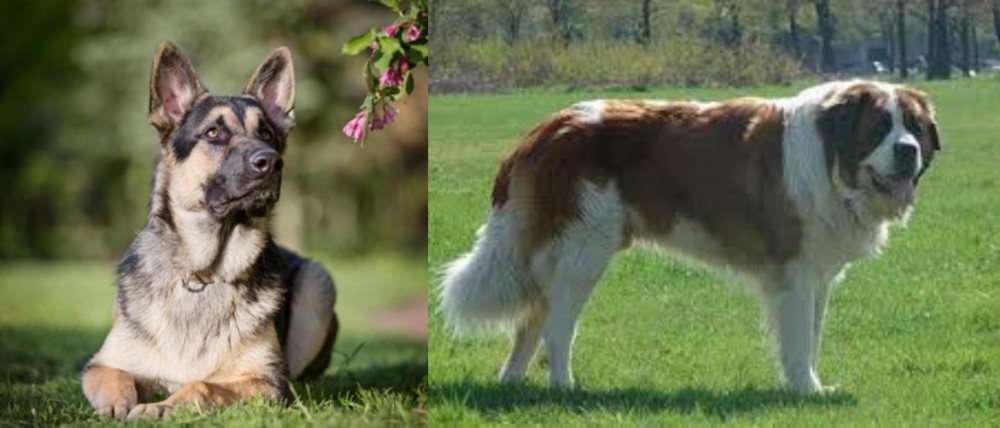 Both East European Shepherd and Moscow Watchdog are originated from Russia. East European Shepherd may grow 7 cm / 3 inches higher than Moscow Watchdog. East European Shepherd may weigh 18 kg / 39 pounds lesser than Moscow Watchdog. Both East European Shepherd and Moscow Watchdog has almost same life span. Both East European Shepherd and Moscow Watchdog has same litter size. Both East European Shepherd and Moscow Watchdog requires Moderate Maintenance.
Both East European Shepherd and Moscow Watchdog are originated from Russia. East European Shepherd may grow 7 cm / 3 inches higher than Moscow Watchdog. East European Shepherd may weigh 18 kg / 39 pounds lesser than Moscow Watchdog. Both East European Shepherd and Moscow Watchdog has almost same life span. Both East European Shepherd and Moscow Watchdog has same litter size. Both East European Shepherd and Moscow Watchdog requires Moderate Maintenance.
 The East European Shepherd is a dog which hails from Russia. The dog was developed in the 1930-1950s as there was a need for a bigger, more robust, weather-resistant type of dog who would perform all kinds of guard duties in the Soviet Union.
The East European Shepherd is a dog which hails from Russia. The dog was developed in the 1930-1950s as there was a need for a bigger, more robust, weather-resistant type of dog who would perform all kinds of guard duties in the Soviet Union.
This is a rare dog breed, created by mixing Russian breeds such as the Laika, Central Asian Shepherd and Caucasian Shepherd to create a strong working dog that could cope well with the sub-freezing conditions.
The standard breed type was established in 1964. The only major kennel club to grant full recognition to the East-European Shepherd is the Russian Kennel Club. In the United States, the dog is recognized by a number of rare breed registries.
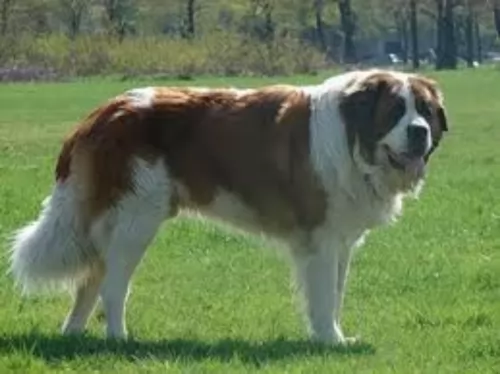 The Moscow Watchdog is a cross between the Caucasian Oytcharka, the St. Bernard and other Russian hound dogs. This large breed dog was developed in the Soviet Union for the purpose of being guard dogs. It had the awareness and assertiveness of the Oytcharka and the size, intelligence and attractiveness of the St. Bernard. The breed is common in Russia today but hardly seen anywhere else even though they were exported to the United States and Europe. The breed had the first U.S. born litter in 2015 and it is not AKC recognized.
The Moscow Watchdog is a cross between the Caucasian Oytcharka, the St. Bernard and other Russian hound dogs. This large breed dog was developed in the Soviet Union for the purpose of being guard dogs. It had the awareness and assertiveness of the Oytcharka and the size, intelligence and attractiveness of the St. Bernard. The breed is common in Russia today but hardly seen anywhere else even though they were exported to the United States and Europe. The breed had the first U.S. born litter in 2015 and it is not AKC recognized.
Following the second world war crime was on the rise in the Soviet Union and a new breed of dog was needed to counter this trend. The dog had to be adaptable to very cold temperatures, snowy weather and have a guard dog personality and ability. The breed was called on to guard such locations as railroads, government offices, warehouses, infrastructure and labor camps.
The project to develop this breed was led by General Medvedev beginning in 1946 at the Central School of Military Kynology – which was a department of the Soviet Ministry of Defense. It took many years to develop the Moscow Watchdog which then became a very successful breed.
It took until 1985 for the breed to be “officially” recognized in the Soviet Union and until 1992 to be recognized by the Federation of Dog Breeders in Russia and until 1997 for the standard to be approved by the Russian Kennel Club. They are still working with the FCI to gain international recognition for the breed. At the moment they are considered a part of the Molosser group and shown in the “Special Show” in Russia.
Committed breeders brought the Moscow Watchdog to Hungary in 1986 in order to make the breed more popular. In addition to this there were many breeders from previous Soviet States that wanted to preserve the breed as well. There were about 500 Moscow Watchdogs in Hungary around then. Currently there are about 27 Moscow Watchdogs in the United States. The breed is known to be a gentle giant and very much a family dog these days.
 The East European Shepherd is larger than a German Shepherd. He is described as a large dog with males and females standing roughly at 66-76 centimeters at the withers and weighing anything between 30–50kg.
The East European Shepherd is larger than a German Shepherd. He is described as a large dog with males and females standing roughly at 66-76 centimeters at the withers and weighing anything between 30–50kg.
The coat with undercoat is medium in length with the standard color being black-and-tan or black-and-red. The dog is solid colored or is light fawn or tan in color with black saddle.
The face of the dog is black and he looks a lot like a wolf in appearance. The ears of the East European Shepherd are medium sized and always erect.The tail is long and hangs low.
The East European Shepherd is an intelligent and confident dog and can be aggressive when aggravated. He is a working dog and to get along with other pets in the home as well as children, the East European Shepherd will need to be trained and socialized, becoming obedient and loyal with his owner.
He is an intelligent dog and training him poses no problem. Loyal and devoted, this dog mostly becomes particularly attached to one member of the family.
There are a number of dog experts who don’t recommend the dog as a family pet as it is a dog reluctant to form a close bond with a child, being irritated by them, especially ill disciplined children.
It is a strong-willed dog too and shouldn’t be the first dog choice for a novice dog owner. They make excellent guard dogs and take their role as protector of the family seriously.
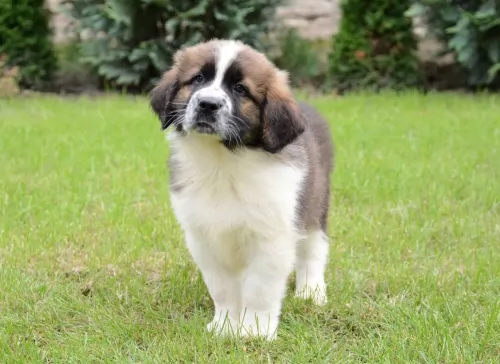 The Moscow Watchdog is related to the mountain dogs and is a very large breed. They are sturdy, muscular and powerful. They have big heads and a thick double coat that sheds profusely four times a year. They have a long tail, an arched chest and an air of confidence.
The Moscow Watchdog is related to the mountain dogs and is a very large breed. They are sturdy, muscular and powerful. They have big heads and a thick double coat that sheds profusely four times a year. They have a long tail, an arched chest and an air of confidence.
He is in the Mastiff family and is smart and trainable. He is not clumsy but has big bones. He is surprisingly agile and active for a dog his size. Unlike the St. Bernard he is not a couch potato. He is also differentiated from the St. Bernard because he does not drool.
These dogs are large but they’ve got a gentle temperament and are good with kids, being playful and energetic with them.
Even though he is a docile dog, you want him trained and socialized, and then he gets along well with other pets too. His sheer size makes it that it is best to supervise him when he’s around small children. He is also a protective dog breed, willing to bond closely to, and protect his human family.
 The East-European Shepherd dogs are balanced, confident, intelligent, loving and playful while also being tough and protective of their owners.
The East-European Shepherd dogs are balanced, confident, intelligent, loving and playful while also being tough and protective of their owners.
They make fantastic guard dogs, becoming aggressive around strangers whom they don’t trust. When you bring a dog like this into the home, it is essential to have him trained and socialized and to also have a firm owner who can deal with such a strong-willed animal.
He is an active, alert dog who will require regular exercise and will slot into life in the city or in the country so long as his exercise needs are met.
When you look after your East European Shepherd you’ll find in him a devoted, loyal friend who will protect you with his life.
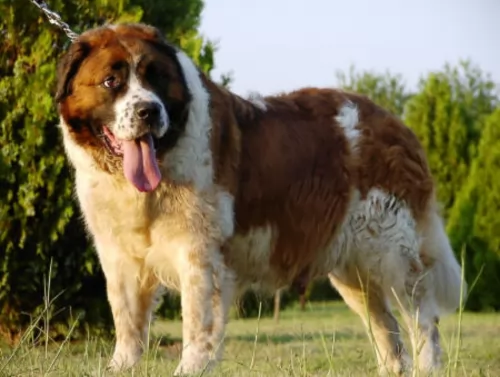 This is a large dog who likes to be involved and busy, even though he is so big. He isn’t suited to city life and being confined to a tiny garden as he needs space.
This is a large dog who likes to be involved and busy, even though he is so big. He isn’t suited to city life and being confined to a tiny garden as he needs space.
They’re independent dogs too and you can leave them alone during the day. He is social, so while you can leave them during the day while you’re at work, he’ll want your attention when you get back. They're such loving, loyal family pets that you owe it to him to make this gentle giant of a dog as happy as can be.
 Regarded as a tough dog who can reach 10 – 12 years of age, the East European Shepherd is prone to hip or elbow dysplasia. This is a a disease that is more prevalent with German Shepherd type dogs.
Regarded as a tough dog who can reach 10 – 12 years of age, the East European Shepherd is prone to hip or elbow dysplasia. This is a a disease that is more prevalent with German Shepherd type dogs.
Dysplasia is a genetic condition which can lead to inflammation and arthritis and even lameness. Unfortunately it can happen with young dogs too, and the vet will suggest different types of treatment which can include surgery.
Degenerative myelopathy is another degenerative disease which can be found with the East European Shepherd. It is a fatal, progressive degenerative disease of the spinal cord. Unfortunately there isn’t treatment for the disease, leading to paralysis of the limbs.
 Moscow Watchdog is looked upon as a fairly healthy dog breed but there are some risks such as hip dysplasia as well as some other large breed problems.
Moscow Watchdog is looked upon as a fairly healthy dog breed but there are some risks such as hip dysplasia as well as some other large breed problems.
With big dogs like this, hip dysplasia is a threat. Its an hereditary condition where the parent dogs pass down the problematic genes. Hip dysplasia results in inflammation and pain for your pet, and where once he loved to play, he is reluctant to and battles to get up after lying down.
 The coat of the East European Shepherd is thick, and while he won’t require any professional grooming, he will require being brushed at least twice a week. This is because he sheds heavily at certain times.
The coat of the East European Shepherd is thick, and while he won’t require any professional grooming, he will require being brushed at least twice a week. This is because he sheds heavily at certain times.
His nails will need to be clipped if they don’t wear down naturally, and his teeth will require regular brushing at least 2 or 3 times a week. Fortunately, because his ears are large and open, he doesn’t easily get an ear infection.
The East European Shepherd is a dog which has always been worked. It is a highly energetic dog and its role as a guard- and herding dog has made it that the dog will require a good dose of exercise.
A long walk may not be enough for this active dog, and he will require intense ball throwing with a tennis racquet to get the ball far away so that he can run far to fetch the ball. Without enough exercise, the East-European Shepherd will develop behavioral problems which will include aggression.
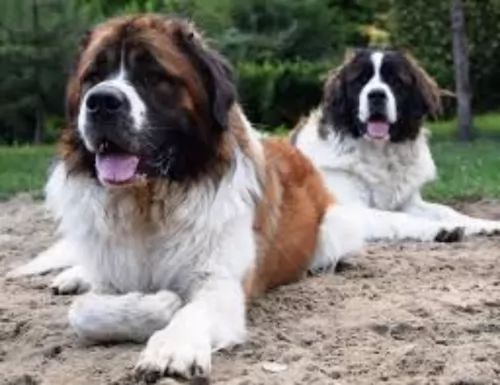 The Moscow Watchdog is a giant sized dog and will require a lot of regular exercise, and apart from a fairly brisk daily walk, will also need games and a run in the park.
The Moscow Watchdog is a giant sized dog and will require a lot of regular exercise, and apart from a fairly brisk daily walk, will also need games and a run in the park.
As a large dog requiring a regular dose of physical exercise as well as mental stimulation, he is better suited to life in the country or at least where there is a large garden.
The Moscow Watchdog has a medium length coat, and as a moderate shedder, you will need to simply brush his coat twice a week to remove loose hair. There is no professional grooming required for these dogs.
Homemade food is always a treat for a dog, but if you’re feeding your Moscow Watchdog commercially manufactured food because of the sheer convenience it provides, make sure the packaging says 'large- or giant dog breed' food. This way you know your pet is getting the right amount of minerals and vitamins for his size.
Always buy the best quality food to avoid giving your pet an overdose of colorants and preservatives. Try and give your pet some home-made food such as boiled chicken, some brown rice or pasta and some cooked vegetables such as sweet potatoes, carrots and spinach. These can be added to his kibble every now and again.
A simple diet like this agrees with your pet and he will be healthy and happy with his lot.